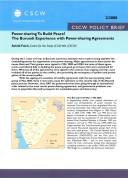In November 2006, a ten-year civil war in Nepal formally ended with a peace agreement signed between the Maoists and seven major political parties. The agreement mandated power-sharing between the groups in an attempt to maintain unity in the country until elections could be held. Specific power-sharing measures to guide Nepal through this transitional phase included the formation of a grand coalition government and consensus decisionmaking. Despite the emergence of spoilers to the peace agreement, the positive-sum nature of the negotiations, the flexibility of the power-sharing mechanisms and the strong national ownership of the process all strengthened the likelihood of a successful transition from civil war to representative democracy. National elections were held in April 2008, and in August a new government led by Maoist leader Prachanda was formed.
Falch, Åshild & Jason Miklian (2008) A Transitional Success Story: The Nepali Experience with Power-sharing, CSCW Policy Brief, 5. Oslo: PRIO.









